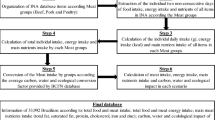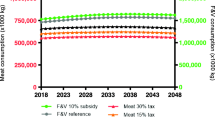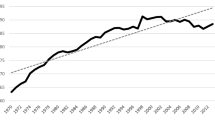Abstract
The responsibility and vulnerability of challenges in planetary health are unequally distributed across countries. In Brazil, meat carries an important cultural value even if from an environmental perspective its production is related to negative impacts. We explored Brazilian meat consumption over time, according to income groups from the perspective of the food inequalities and food justice and we analyzed its impacts on the environment. We used data from the 2008 and 2017 Household Budget Surveys to estimate meat intake and meat prices according to income level. The environmental impact indicators were based on the WWF Report. We analyzed the relationship between income, meat price, and its consumption by linear regression model. Brazilian meat intake was 86 g/1000 kcal in 2008, which is considered high intake and Brazilians increased meat intake by 12% from 2008 to 2017, with variations according to types of meat and income levels. Individuals of the lowest income stratum did not increase their meat consumption, and they spent around 17 times more of their income to buy one kilogram of beef compared to people from the highest income group. There was a significant positive relationship between purchasing power and intake of meat across income groups. In 2017, meat contributed to 86% of the Brazilian diet’s carbon footprint. In Brazil, relevant factors for meat intake may be associated with restricted purchasing power, food affordability, rising prices and income inequalities. Our findings indicate the relevance not only of food availability and intake but also the local variables such as socio-economic inequalities and cultural meanings food can assume.




Similar content being viewed by others
Data Availability
The datasets generated during the current study are available from the corresponding author on reasonable request.
References
Béné, C., Oosterveer, P., Lamotte, L., Brouwer, I. D., de Haan, S., Prager, S. D., Talsma, E. F., & Khoury, C. K. (2019). When food systems meet sustainability: Current narratives and implications for actions. World Development, 113, 116–130. https://doi.org/10.1016/j.worlddev.2018.08.011.
Connell, R. (2007). The Northern theory of globalization. Sociological Theory, 25(4), 368–385. https://doi.org/10.1111/j.1467-9558.2007.00314.x.
de Carvalho, A. M., Selem, S. S., de Miranda, C., A. M., & Marchioni, D. M. (2016). Excessive red and processed meat intake: Relations with health and environment in Brazil. British Journal of Nutrition, 115(11), 2011–2016. https://doi.org/10.1017/S0007114516000969.
Ficek, R. E. (2019). Cattle, capital, colonization: Tracking creatures of the anthropocene in and out of human projects. Current Anthropology, 60(S20), S260–S271. https://doi.org/10.1086/702788
Jones, A. D., Hoey, L., Blesh, J., Miller, L., Green, A., & Shapiro, L. F. (2016). A systematic review of the measurement of sustainable diets. Advances in Nutrition: An International Review Journal, 7(4), 641–664. https://doi.org/10.3945/an.115.011015.
Maluf, R. S. (2021). Decentralized food systems and eating in localities: A multi-scale approach. Revista de Economia e Sociologia Rural, 59(4), e238782. https://doi.org/10.1590/1806-9479.2021.238782
Micha, R., Michas, G., & Mozaffarian, D. (2012). Unprocessed red and processed meats and risk of coronary artery disease and type 2 diabetes: An updated review of the evidence. Current Atherosclerosis Reports, 14(6), 515–524. https://doi.org/10.1007/s11883-012-0282-8
Motta, R. (2021). Social movements as agents of change: Fighting intersectional food inequalities, building food as webs of life. The Sociological Review, 69(3), 603–625. https://doi.org/10.1177/00380261211009061.
Popkin, B., & Ng, S. W. (2007). The nutrition transition in high- and low-income countries: What are the policy lessons? The nutrition transition in high- and low-income countries. Agricultural Economics, 37, 199–211. https://doi.org/10.1111/j.1574-0862.2007.00245.x
Portilho, F., Castañeda, M., & de Castro, I. R. R. (2011). A alimentação no contexto contemporâneo: Consumo, ação política e sustentabilidade. Ciência & Saúde Coletiva, 16(1), 99–106. https://doi.org/10.1590/S1413-81232011000100014.
Rose, D., Heller, M. C., & Roberto, C. A. (2019). Position of the Society for Nutrition Education and Behavior: The importance of including environmental sustainability in Dietary Guidance. Journal of Nutrition Education and Behavior, 51(1), 3-15e1. https://doi.org/10.1016/j.jneb.2018.07.006
Sun, Q. (2012). Red meat consumption and mortality: Results from 2 prospective cohort studies. Archives of Internal Medicine, 172(7), 555. https://doi.org/10.1001/archinternmed.2011.2287
Swinburn, B. A., Kraak, V. I., Allender, S., Atkins, V. J., Baker, P. I., Bogard, J. R., Brinsden, H., Calvillo, A., De Schutter, O., Devarajan, R., Ezzati, M., Friel, S., Goenka, S., Hammond, R. A., Hastings, G., Hawkes, C., Herrero, M., Hovmand, P. S., Howden, M., & Dietz, W. H. (2019). The global syndemic of obesity, undernutrition, and climate change: The lancet commission report. The Lancet, 393(10173), 791–846. https://doi.org/10.1016/S0140-6736(18)32822-8.
Triches, R. M. (2021). Sustainable diets: Definition, state of the art and perspectives for a new research agenda in Brazil. Ciência & Saúde Coletiva, 26(5), 1833–1846. https://doi.org/10.1590/1413-81232021265.09742019
Vergnaud, A. C., Norat, T., Romaguera, D., Mouw, T., May, A. M., Travier, N., Luan, J., Wareham, N., Slimani, N., Rinaldi, S., Couto, E., Clavel-Chapelon, F., Boutron-Ruault, M. C., Cottet, V., Palli, D., Agnoli, C., Panico, S., Tumino, R., Vineis, P., & Peeters, P. H. (2010). Meat consumption and prospective weight change in participants of the EPIC-PANACEA study. The American Journal of Clinical Nutrition, 92(2), 398–407. https://doi.org/10.3945/ajcn.2009.28713.
Willett, W., Rockström, J., Loken, B., Springmann, M., Lang, T., Vermeulen, S., Garnett, T., Tilman, D., DeClerck, F., Wood, A., Jonell, M., Clark, M., Gordon, L. J., Fanzo, J., Hawkes, C., Zurayk, R., Rivera, J. A., De Vries, W., Sibanda, M., & Murray, L. (2019). Food in the Anthropocene: The EAT–Lancet Commission on healthy diets from sustainable food systems. The Lancet, 393(10170), 447–492. https://doi.org/10.1016/S0140-6736(18)31788-4
Zhong, V. W., Van Horn, L., Greenland, P., Carnethon, M. R., Ning, H., Wilkins, J. T., Lloyd-Jones, D. M., & Allen, N. B. (2020). Associations of processed meat, unprocessed Red Meat, Poultry, or Fish Intake With Incident Cardiovascular Disease and all-cause mortality. JAMA Internal Medicine. https://doi.org/10.1001/jamainternmed.2019.6969.
Alkon, A. (2013). Food Justice: An overview. Routledge: Routledge International Handbook of Food Studies
Barone, B., Nogueira, R. M., de Guimarães, K. R. L. S. L. Q., & Behrens, J. H. (2019). Sustainable diet from the urban Brazilian consumer perspective. Food Research International, 124, 206–212. https://doi.org/10.1016/j.foodres.2018.05.027
Belik, W. (2020). Estudo sobre a Cadeia de Alimentos. Imaflora. https://www.ibirapitanga.org.br/wp-content/uploads/2020/10/EstudoCadeiaAlimentos_%C6%92_13.10.2020.pdf
Castro, J. (1965). Geografia da fome—O dilema brasileiro: Pão ou aço. Brasiliense.
CEPEA (2022). International market may continue driving prices in 2022. https://cepea.esalq.usp.br/en/brazilian-agribusiness-news/international-market-may-continue-driving-prices-in-2022.aspx
Chappell, M. J., Wittman, H., Bacon, C. M., Ferguson, B. G., Barrios, L. G., Barrios, R. G., Jaffee, D., Lima, J., Méndez, V. E., Morales, H., Soto-Pinto, L., Vandermeer, J., & Perfecto, I. (2013). Food sovereignty: An alternative paradigm for poverty reduction and biodiversity conservation in Latin America. F1000Research, 2, 235. https://doi.org/10.12688/f1000research.2-235.v1
Coffey, C. (2020). Time to care: unpaid and underpaid care work and the global inequality crisis. Oxfam GB for Oxfam International.
Daniel, J., & Cravo, V. (2005). Olhares antropológicos sobre a alimentação: Valor social e cultural da alimentação. In Antropologia e nutrição: Um diálogo possível. Fiocruz.
FAO (2010). Sustainable diets and biodiversity: Directions and solutions for policy, research and action. http://www.fao.org/docrep/016/i3004e/i3004e.pdf
FAO (2019). The state of the world’s biodiversity for food and agriculture. FAO. http://www.fao.org/3/CA3129EN/CA3129EN.pdf
FAO. (2021). FAOSTAT Statistical Database. FAO.
Gringo, M. (2020). Análise sobre a produção de carnes no Brasil. Tricontinental. https://thetricontinental.org/pt-pt/brasil/analise-sobre-a-producao-de-carnes-no-brasil/
Hase-Ueta, M. (2021). O sabor da prosperidade: Diálogos intergeracionais sobre consumo alimentar e impacto ambiental na China e no Brasil. Unicamp.
Hunter, D., Guarino, L., Spillane, C., & McKeown, P. C. (Eds.). (2017). Routledge Handbook of Agricultural Biodiversity (1st ed.). Routledge. https://doi.org/10.4324/9781317753285
Iberê, D. (2020). Povos indígenas: Alimentos, ancestralidade e sagrado em tempos de crise. FIOCRUZ. arca.fiocruz.br/handle/icict/42442.
IBGE (Ed.). (2010). Pesquisa de orçamentos familiares, 2008–2009 Análise do Consumo Alimentar Pessoal no Brasil. Instituto Brasileiro de Geografia e Estatística - IBGE.
IBGE. (2020a). Pesquisa de Orçamentos Familiares 2017–2018 Análise da segurança alimentar no Brasil. Instituto Brasileiro de Geografia e Estatística - IBGE.
IBGE (2020b). Pesquisa de Orçamentos Familiares, 2017–2018 Análise do consumo alimentar pessoal no Brasil.
IHME (2019a). GBD compare | Brazil. http://ihmeuw.org/5rlq
IHME (2019b). GBD compare | Brazilian deaths. http://ihmeuw.org/5rlr
IHME (2019c). GBD compare | Deaths. http://ihmeuw.org/5rlp
Marques, L. (2018). Capitalismo e colapso ambiental. Editora da Unicamp.
Monteiro, C. A., Cannon, G., Moubarac, J. C., Martins, A. P. B., Martins, C. A., Garzillo, J., Canella, D. S., Baraldi, L. G., Barciotte, M., Louzada, M. L. da, Levy, C., Claro, R. B., R. M., & Jaime, P. C. (2015). Dietary guidelines to nourish humanity and the planet in the twenty-first century. A blueprint from Brazil. Public Health Nutrition, 18(13), 2311–2322. https://doi.org/10.1017/S1368980015002165
The Good Food Institute Brazil (2020). O consumidor brasileiro e o mercado plant-based. The Good Food Institute Brazil. https://gfi.org.br/wp-content/uploads/2021/02/O-consumidor-brasileiro-e-o-mercado-plant-based.pdf
World Bank (2020). World Development Indicators Database. Gini index—Brazil. https://data.worldbank.org/indicator/SI.POV.GINI?locations=BR
World Resources Institute (2019). Creating a sustainable food future.
WWF (2020). Bending the curve: The restorative power of planet-based diets
Zaluar, A. (1982). As mulheres e a direção do consumo doméstico. In Colcha de Retalhos. Brasiliense.
Acknowledgements
The authors would like to thank the Brazilian Institute of Geography and Statistics, which was involved in official data collection and data availability.
Author information
Authors and Affiliations
Corresponding author
Additional information
Publisher’s Note
Springer Nature remains neutral with regard to jurisdictional claims in published maps and institutional affiliations.
Rights and permissions
Springer Nature or its licensor (e.g. a society or other partner) holds exclusive rights to this article under a publishing agreement with the author(s) or other rightsholder(s); author self-archiving of the accepted manuscript version of this article is solely governed by the terms of such publishing agreement and applicable law.
About this article
Cite this article
Hase Ueta, M., Tanaka, J., Marchioni, D.M.L. et al. Food sustainability in a context of inequalities: meat consumption changes in Brazil (2008–2017). Environ Dev Sustain 26, 6377–6391 (2024). https://doi.org/10.1007/s10668-023-02967-x
Received:
Accepted:
Published:
Issue Date:
DOI: https://doi.org/10.1007/s10668-023-02967-x




